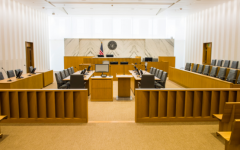
California State Capitol. (Photo: Kevin Sanders for California Globe)
Court Labor Relations
Allows an agency shop agreement to be negotiated between a trial court and a recognized employee organization
By Chris Micheli, November 6, 2024 3:22 pm
Section 71630 provides that it is the purpose of this article to promote full communication between trial courts and their employees by providing a reasonable method for resolving disputes regarding wages, hours, and other terms and conditions of employment between trial courts and recognized employee organizations.
In addition, the Legislature finds and declares that the duties and responsibilities of trial court representatives under this article are substantially similar to the duties and responsibilities required under existing collective bargaining enforcement procedures and therefore the costs incurred by the trial court representatives in performing those duties and responsibilities under this article are not reimbursable as state-mandated costs.
Section 71631 requires trial court employees to have the right to form, join, and participate in the activities of employee organizations of their own choosing for the purpose of representation on all matters of employer-employee relations. In addition, trial court employees have the right to refuse to join or participate in the activities of employee organizations.
Section 71632.5 allows an agency shop agreement to be negotiated between a trial court and a recognized employee organization that has been recognized as the exclusive or majority bargaining agent pursuant to reasonable rules and regulations, and enactments, in accordance with this article. The term “agency shop” is defined.
Section 71632 provides that, if the trial court is party to any memorandum of understanding or agreement with any bargaining unit that includes court employees that provides for an agency shop provision as of the implementation date of this chapter, the trial court and employee organization representing the trial court employees are required to honor the terms of the agency shop provision.
Section 71633 requires recognized employee organizations to have the right to represent their members in their employment relations with trial courts as to matters covered by this article. Employee organizations may establish reasonable restrictions regarding who may join and may make reasonable provisions for the dismissal of individuals from membership.
Section 71634 requires the scope of representation to include all matters relating to employment conditions and employer-employee relations, including, but not limited to, wages, hours, and other terms and conditions of employment. However, the scope of representation does not include consideration of the merits, necessity, or organization of any service or activity provided by law or executive order. Six matters are specifically excluded from the scope of representation.
Section 71634.1 requires the trial court to give reasonable written notice to each recognized employee organization affected by any rule, practice, or policy directly relating to matters within the scope of representation proposed to be adopted by the trial court and give each such recognized employee organization the opportunity to meet with the trial court. There are special rules in cases of emergency.
Section 71634.2 requires the trial court to meet and confer in good faith regarding wages, hours, and other terms and conditions of employment within the scope of representation with representatives of the recognized employee organizations, and consider fully the presentations as are made by the recognized employee organization on behalf of its members prior to arriving at a determination of policy or course of action.
Section 71634.3 says that, if agreement is reached by the representatives of the trial court and a recognized employee organization or organizations, they jointly prepare a written memorandum of the agreement or understanding, which is not binding, and present it to the trial court or its designee for determination.
Section 71634.4 provides that, if after a reasonable period of time, representatives of the trial court and the recognized employee organization fail to reach agreement, the trial court and the recognized employee organization or recognized employee organizations together may agree upon the appointment of a mediator mutually agreeable to the parties.
Section 71635 requires the trial court to allow a reasonable number of trial court employee representatives of recognized employee organizations reasonable time off, without loss of compensation or other benefits, when formally meeting and conferring with representatives of the trial court on matters within the scope of representation.
Section 71635.1 prohibits trial courts and employee organizations from not interfering with, intimidating, restraining, coercing, or discriminating against court employees because of their exercise of their rights.
Section 71636 authorizes a trial court to adopt reasonable rules and regulations, after consultation in good faith with representatives of a recognized employee organization or organizations, for the administration of employer-employee relations under this article. These rules and regulations may include nine specified provisions.
Section 71636.1 provides that, in the absence of local procedures for resolving disputes on the appropriateness of a unit of representation, upon the request of any of the parties, the dispute must be submitted to the California State Mediation and Conciliation Service for the mediation or for recommendation for resolving the dispute.
Section 71636.3 requires unit determinations and representation elections to be determined and processed in accordance with rules adopted by a trial court in accordance with this chapter. In a representation election, a majority of the votes cast by the employees in the appropriate bargaining unit is required.
In addition, a trial court is required to grant exclusive or majority recognition to an employee organization based on a signed petition, authorization cards, or union membership cards showing that a majority of the employees in an appropriate bargaining unit desire the representation, unless another labor organization has previously been lawfully recognized as exclusive or majority representative of all or part of the same unit.
Section 71637 prohibits professional employees from being denied the right to be represented separately from nonprofessional employees by a professional employee organization consisting of those professional employees. The term “professional employees” is defined.
Section 71637.1 authorizes a trial court to adopt reasonable rules and regulations providing for designation of the management and confidential employees of the trial court and restricting those employees from representing any employee organization that represents other employees of the trial court, on matters within the scope of representation.
Section 71638 requires a trial court employee to have the right to authorize, and the trial court employer must honor, a dues deduction from his or her salary or wages.
Section 71639 requires an employee organization that is recognized as a representative of a group of trial court employees or the exclusive representative of an established bargaining unit of trial court employees to continue to be recognized by the trial court as a representative or the exclusive representative of the same trial court employees.
In addition, a trial court and recognized employee organization are bound by the terms of any memorandum of understanding or agreement covering trial court employees to which the trial court or the county is a party that is in effect on the implementation date of this chapter.
Section 71639.1 defines the term “board.” The powers and duties of the board apply, as appropriate, to this article and the include specified authority. In addition, a complaint alleging any violation of this article or of any rules and regulations adopted by a trial court must be processed as an unfair practice charge by the board. The determinations of the unfair practice charge mut be justified. The board is required to, but nothing herein shall require a charging party to exhaust a remedy when that remedy would be futile. Also, the board is required to enforce rules adopted by a trial court concerning unit determinations, representation, recognition, and elections.
Section 71639.15 provides, if a decision by an administrative law judge regarding the recognition or certification of an employee organization is appealed, the decision is deemed the final order of the board if the board does not issue a ruling that supersedes the decision on or before 180 days after the appeal is filed.
Section 71639.2 states the enactment of this article is not to be construed as making Section 923 of the Labor Code applicable to trial court employees.
Section 71639.3 provides that trial courts and trial court employees are not covered by Chapter 10 (commencing with Section 3500) of Division 4 of Title 1, or any subsequent changes to these sections except as provided in this article.
Section 71639.4 specifies that any charging party, respondent, or intervenor aggrieved by a final decision or order of the board in an unfair practice case, except a decision of the board not to issue a complaint in such a case, may petition for a writ of extraordinary relief from that decision or order. There are specified requirements for filing petitions for a write of extraordinary relief.
Section 71639.5 provides that any written agreements reached through negotiations held pursuant to this article are binding upon the parties requiring the issuance of a writ to an inferior tribunal, and any of those agreements may be enforced by petitioning the superior court for relief pursuant to of the Code of Civil Procedure. This Judicial Council is required to adopt rules of court that provide a mechanism for the establishment of a panel of court of appeal justices who are qualified to hear petitions under specified statutes.
- Fishing Traps in California - March 1, 2026
- What Type of Lobbyist Do You Want to Be? - February 28, 2026
- Proration of Estate Taxes - February 28, 2026



